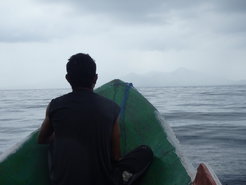Past Humans Not the Cause of Island Extinctions
New research led by scientists from Griffith University and the Max Planck Institute for the Science of Human History reveals that the arrival of Pleistocene humans and their hominin ancestors to uninhabited islands didn’t always lead to widespread extinctions, as is often thought.
Published in Proceedings of National Academy of Sciences, the research team examined archaeological and paleontological records of all islands inhabited by humans over the last 2.6 million years, finding that hominin arrivalsoften had minimal impacts on biodiversity loss.
“We often have this picture that as soon as people arrive in a new ecosystem, they cause untold amounts of damage” says lead researcher Associate Professor Julien Louys, from the Australian Research Centre for Human Evolution, “but we found that this was only the case for the most recent human arrivals on islands.”

The team, comprised of archaeologists and palaeontologists, met in 2017 and compared records of hominin arrival and faunal extinctions on islands spanning the last 2.6 million years. Surprisingly, they found very little overlap between the two events.
“Based on classic cases of island extinction from the more recent past, we expected that mass extinction should shortly follow island colonisation,” says Louys, “however, when we examined the data, there were very few cases where this could be demonstrated.
“Even in cases where there was a close link between hominin arrival and island extinctions, these could not be disentangled from records of environmental change brought about by global climatic events and changing sea levels.”
The team also recorded several instances of hominins abandoning islands, and even of human ancestors going extinct.
“The unique ecological conditions that drive island extinctions definitely didn’t spare humans either,” said Professor Sue O’Connor of the Australian National University, the senior researcher on the study.
Island ecosystems are some of the most at risk in the world today and understanding the impacts of earlier people on these environments, and how they contrast with the impacts of 21st century societies, is critical for safeguarding them into the future.
As Dr. Patrick Roberts, Research Group Leader at the Max Planck Institute for the Science of Human History and co-author puts it, “the onset of significant human disruption to island ecosystems actually seems to occur with the spread of agriculture, the introduction of new species and, perhaps most significantly, the arrival of colonial and capitalist forces of extractive clearance and plantation systems over the course of the last 500 years.”
The authors hope that by studying the impacts of different human populations, economies, and societies on island environments across space and time, we can gain better insights into how they can be better managed today.
